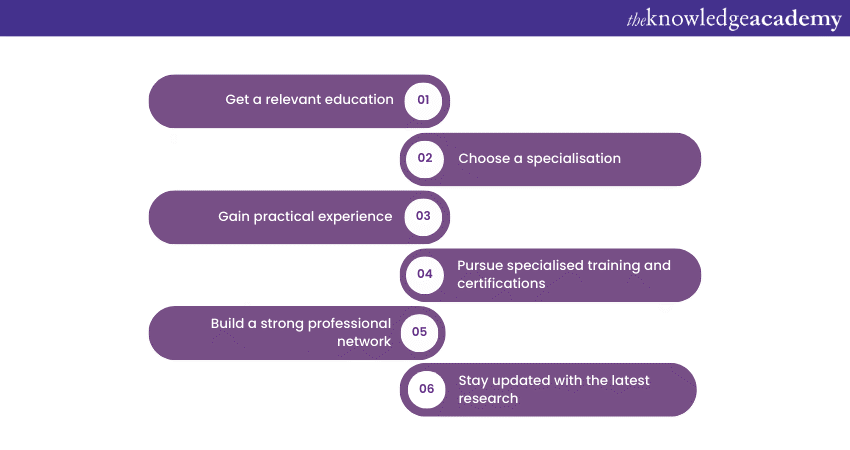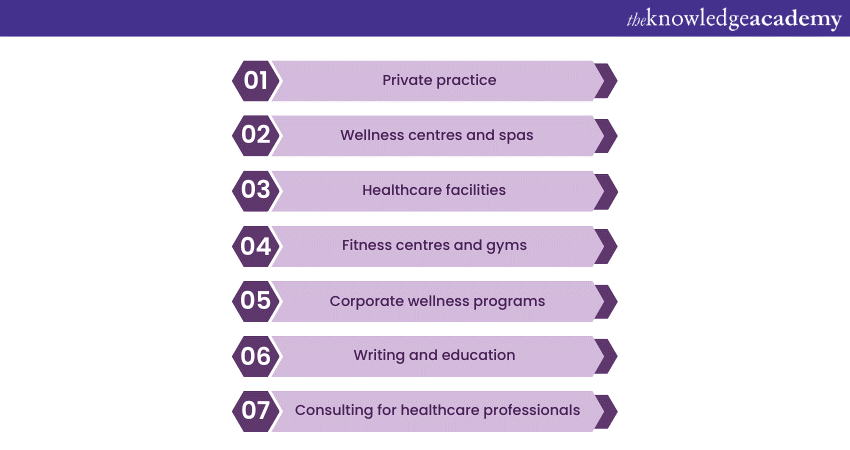We may not have the course you’re looking for. If you enquire or give us a call on + 800 908601 and speak to our training experts, we may still be able to help with your training requirements.
Training Outcomes Within Your Budget!
We ensure quality, budget-alignment, and timely delivery by our expert instructors.

Nutritional Therapy has gained significant recognition in recent years as people become more conscious of their health and well-being. Nutritional Therapists play a crucial role in helping individuals achieve optimal health through personalised dietary and lifestyle recommendations. If you're passionate about Nutrition and want to know How to Become a Nutritional Therapist, this blog is for you.
The U.S. Bureau of Labor Statistics reports that the employment rate of Dietitians and Nutritionists is estimated to grow by 8% from during the years 2019 to 2029. This growth rate surpasses the average expansion seen across all occupations.
This shows that career paths for Nutrition professionals are also in high demand. So, it’s time to invest in this field. Read this blog to learn about Nutritional Therapists. Also, explore How to Become a Nutritional Therapist in six simple steps.
Table of Contents
1) Understanding How to Become a Nutritional Therapist
a) Get a relevant educational background
b) Choose a specialisation
c) Gain practical experience
d) Pursue specialised training and certifications
e) Build a strong professional network
f) Stay updated with the latest research
2) Skills required for Nutritional Therapists
3) Career opportunities for certified Nutritional Therapists
4) Conclusion
Understanding How to Become a Nutritional Therapist
A Nutritional Therapist is a healthcare professional specialising in improving individuals' health through Nutrition. They conduct thorough assessments of clients' dietary habits, medical history, and health goals. Analysing nutrient intake and potential imbalances, they create personalised Nutrition plans.
Nutritional Therapists also provide education and ongoing support, empowering clients to make sustainable dietary choices. By monitoring progress and adapting plans as necessary, they help clients achieve and maintain their health and wellness objectives through the power of Nutrition.
Becoming a Nutritional Therapist requires a comprehensive approach that encompasses education, practical experience, specialised training, networking, and a dedication to staying updated with the latest research. Let's delve deeper into each step:

Step 1: Get a relevant education
A strong educational foundation is required for a successful career in Nutritional Therapy. So, consider joining a degree program related to Nutrition, dietetics, or a closely related field. Look for accredited institutions that offer coursework in subjects like Human Anatomy, Physiology, Biochemistry, and the role of nutrients in health and disease. A solid understanding of these fundamentals will provide you with the knowledge necessary to assess clients' Nutritional needs and create tailored plans.
Step 2: Choose a specialisation
Nutritional Therapy covers a wide range of health concerns, so it's beneficial to specialise in an area that resonates with you. Whether it's Sports Nutrition, Weight Management, Paediatric Nutrition, or Holistic Wellness, selecting a specialisation allows you to focus your expertise and customise your services to a specific audience.
Step 3: Gain practical experience
As for any field, practical experience is essential for bridging the gap between theory and real-world application. Seek opportunities to work with clients under the guidance of experienced professionals. Internships, volunteer positions, or part-time jobs at healthcare clinics, hospitals, wellness centres, or even community organisations can provide you with hands-on experience in assessing clients' Nutritional status, developing meal plans, and offering personalised guidance.
During this phase, you'll refine your technical as well as soft skills. You can enhance your communication skills by asking the right questions and adapting your recommendations to suit individual needs. Practical experience also exposes you to the diverse range of challenges clients might face, enabling you to become a more empathetic and effective Nutritional Therapist.
Step 4: Pursue specialised training and certifications
While a degree lays the foundation, specialised training and certifications in Nutritional Therapy add a layer of expertise to your skill set. Look for respected organisations that offer recognised certifications in Nutritional Therapy. These programs often cover advanced topics such as Nutritional Assessment, Dietary Planning, Supplementation, and the integration of holistic practices.
Certifications not only demonstrate your commitment to professionalism but also provide validation of your knowledge and skills. They also offer a structured curriculum that deepens your understanding of Nutritional Science and equips you with practical tools to create effective plans for clients with varying needs.
Step 5: Build a strong professional network
Networking is invaluable for career development in any field, and Nutritional Therapy is no exception. Connect with established professionals in the field by attending conferences, workshops, seminars, and local meetups. Engage in conversations, seek mentorship, and share your own experiences and insights.
Building a network not only provides you with guidance and support but also exposes you to diverse perspectives and approaches to Nutritional Therapy. Collaboration with other practitioners, such as Dietitians, doctors, and Naturopaths, can lead to referrals and collaborative opportunities, enhancing your credibility and reach.
Step 6: Stay updated with the latest research
The field of Nutrition is dynamic, with new research constantly reshaping our understanding of dietary patterns, nutrient interactions, and their impact on health. So, commit to staying current by subscribing to reputable journals, following esteemed Nutrition researchers and experts on social media, and participating in webinars and online courses.
Continuously updating your knowledge base ensures that your advice is evidence-based and aligns with the latest scientific findings. This ongoing learning process distinguishes you as a knowledgeable and reliable source of information for your clients.
Discover the path to wellness! Engage in Healthy Lifestyles Training and transform your daily routine!
Skills required for Nutritional Therapists
Apart from theoretical knowledge and experience, there are certain skills you must know when learning How to Become a Nutritional Therapist. These skills include:
a) Communication: Effective communication is essential to understand clients' needs and educate them about dietary changes.
b) Empathy: Being empathetic helps you connect with clients on a personal level and create tailored plans that address their concerns.
c) Analytical thinking: Assessing clients' medical history, dietary habits, and lifestyle choices requires strong analytical skills to develop suitable recommendations.
d) Problem-solving: Every client is unique, and Nutritional Therapists must develop creative solutions to address various health challenges.
e) Patience: Progress takes time, and Nutritional Therapists must be patient while clients adapt to new dietary and lifestyle changes.
Take the first step towards becoming a professional Nutritional Therapist with our comprehensive Nutrition and Fitness Training. Register now!
Career opportunities for certified Nutritional Therapists
After you have learned How to Become a Nutritional Therapist, it’s time to explore the career opportunities offered in this field. The field of Nutrition opens up a world of diverse and fulfilling career opportunities. Your expertise in helping individuals make informed dietary and lifestyle choices can be applied across various settings. Let's explore some of the rewarding career paths available to you:

1) Private practice
Running your own private practice as a Nutritional Therapist allows you to work directly with clients, creating personalised Nutrition plans based on their unique needs and health goals. This approach provides you with the autonomy to design holistic wellness programs and establish long-lasting relationships with clients seeking your expertise.
2) Wellness centres and spas
Many wellness centres and spas offer Nutritional services as part of their holistic approach to health. As a Nutritional Therapist, you could collaborate with these establishments to provide consultations, conduct workshops, and contribute to wellness retreats. This setting often allows you to engage with a diverse clientele seeking relaxation, rejuvenation, and improved overall health.
3) Healthcare facilities
Hospitals, clinics, and medical practices increasingly recognise the vital role of Nutrition in preventive care and treatment plans. By collaborating with healthcare professionals like doctors and Dietitians, you can contribute your expertise to patient care, helping manage chronic conditions, supporting recovery, and enhancing overall well-being.
4) Fitness centres and gyms
Fitness enthusiasts and individuals looking to achieve specific fitness goals can benefit from your guidance as a Nutritional Therapist. You can develop Nutrition plans that complement exercise routines and optimise performance by collaborating with personal trainers and fitness instructors.
5) Corporate wellness programs
Businesses are recognising the importance of employee well-being for productivity and job satisfaction. You can partner with companies to provide Nutritional workshops, seminars, and wellness challenges to employees. Helping them make healthier food choices and adopt better lifestyle habits can lead to improved energy levels, reduced absenteeism, and a more engaged workforce.
6) Writing and education
If you have a passion for writing and education, you can share your expertise through articles, blogs, books, and online courses. Writing about Nutrition-related topics, debunking myths, and offering practical advice can establish you as an authority in the field. Online courses and webinars allow you to reach a wider audience seeking to improve their health through informed choices.
Unlock the path to promoting a healthy lifestyle with our specialised Active and Healthy Lifestyle Training. Register now and make a difference!
7) Consulting for healthcare professionals
Medical professionals often seek guidance from Nutritional Therapists to incorporate dietary recommendations into patient care plans. Collaborating with doctors, nurses, and other healthcare providers can offer you a consulting role where you contribute your expertise in Nutrition to comprehensive treatment strategies.
8) Public speaking and workshops
Public speaking engagements and workshops offer opportunities to share your knowledge with larger audiences. You can present at conferences, community events, schools, and wellness expos, educating people about the importance of Nutrition and empowering them to make healthier choices.
9) Online Platforms and social media
Utilise the power of digital platforms and social media to connect with a global audience. You can make a strong online presence through social media profiles, blogs, podcasts, and YouTube channels, offering valuable insights, tips, and resources related to Nutritional health.
Conclusion
We hope this blog guided you on How to How to Become a Nutritional Therapist. By following the steps outlined above, you can build a successful career in the field of Nutritional Therapy. Remember, your expertise has the potential to positively impact individuals and communities, making the effort well worth it.
Elevate your career in wellness and coaching by joining our comprehensive Life Coach Training. Secure your spot today!
Frequently Asked Questions
Upcoming Business Skills Resources Batches & Dates
Date
 Life Coach Training
Life Coach Training
Fri 28th Mar 2025
Fri 23rd May 2025
Fri 4th Jul 2025
Fri 24th Oct 2025
Fri 5th Dec 2025







 Top Rated Course
Top Rated Course



 If you wish to make any changes to your course, please
If you wish to make any changes to your course, please


